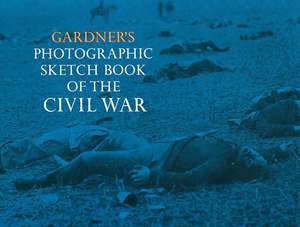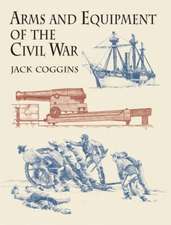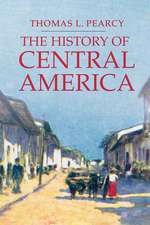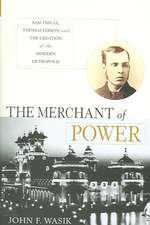Photographic Sketch Book of the Civil War: Civil War
Autor Alexander Gardneren Limba Engleză Paperback – 31 mai 1959
Second only to Mathew Brady as the foremost early American photographer was Alexander Gardner, the one-time manager of Brady's Washington salon and Brady's chief photographer in the field during the early days of the Civil War.
Indeed, Gardner who later photographed the War independently often managed the famous horse-drawn photographic laboratory and took many of the pictures that used to be attributed to Brady. He accompanied the Union troops on their marches, their camps and bivouacs, their battles, and on their many hasty retreats and routs during the early days of the War.
In 1866 Alexander Gardner published a very ambitious two-volume work which contained prints of some 100 photographs which he had taken in the field. A list of them reads like a roster of great events and great men: Antietam Bridge under Travel, President Lincoln (and McClellan) at Antietam, Pinkerton and His Agents in the Field, Ruins of Richmond, Libby Prison, McLean's House Where Lee's Surrender Was Signed, Meade's Headquarters at Gettysburg, Battery D, Second U.S. Artillery in Action at Fredericksburg, the Slaughter Pen at Gettysburg, and many others. This publication is now amoung the rarest American books, and is here for the first timerepublished inexpensively.
Gardner's photographs are among the greatest war pictures ever taken and are also among the most prized records of American history. Gardner was quite conscious of recording history, and spared himself no pains or risk to achieve the finest results. His work indicates a technical mastery that now seems incredible whenone bears in mind the vicissitudes of collodion applications in the field, wet plates, long exposures, long drying times, imperfect chemicals plus enemy bullets around the photographer's ears. It has been said of these photographs: photography today . . . is far easier, but it is no better."
Din seria Civil War
-
 Preț: 270.71 lei
Preț: 270.71 lei -
 Preț: 197.52 lei
Preț: 197.52 lei -
 Preț: 160.81 lei
Preț: 160.81 lei -
 Preț: 116.68 lei
Preț: 116.68 lei -
 Preț: 232.70 lei
Preț: 232.70 lei -
 Preț: 138.08 lei
Preț: 138.08 lei -
 Preț: 274.82 lei
Preț: 274.82 lei -
 Preț: 270.27 lei
Preț: 270.27 lei -
 Preț: 124.98 lei
Preț: 124.98 lei -
 Preț: 160.63 lei
Preț: 160.63 lei -
 Preț: 141.23 lei
Preț: 141.23 lei -
 Preț: 87.51 lei
Preț: 87.51 lei -
 Preț: 209.14 lei
Preț: 209.14 lei -
 Preț: 167.38 lei
Preț: 167.38 lei -
 Preț: 278.99 lei
Preț: 278.99 lei -
 Preț: 145.04 lei
Preț: 145.04 lei -
 Preț: 247.10 lei
Preț: 247.10 lei -
 Preț: 210.59 lei
Preț: 210.59 lei -
 Preț: 204.44 lei
Preț: 204.44 lei -
 Preț: 87.70 lei
Preț: 87.70 lei -
 Preț: 129.91 lei
Preț: 129.91 lei -
 Preț: 122.77 lei
Preț: 122.77 lei -
 Preț: 245.62 lei
Preț: 245.62 lei -
 Preț: 139.98 lei
Preț: 139.98 lei -
 Preț: 108.41 lei
Preț: 108.41 lei -
 Preț: 262.19 lei
Preț: 262.19 lei -
 Preț: 86.88 lei
Preț: 86.88 lei -
 Preț: 159.40 lei
Preț: 159.40 lei -
 Preț: 120.81 lei
Preț: 120.81 lei -
 Preț: 158.95 lei
Preț: 158.95 lei -
 Preț: 107.18 lei
Preț: 107.18 lei -
 Preț: 136.85 lei
Preț: 136.85 lei -
 Preț: 167.38 lei
Preț: 167.38 lei -
 Preț: 174.76 lei
Preț: 174.76 lei -
 Preț: 122.86 lei
Preț: 122.86 lei -
 Preț: 286.67 lei
Preț: 286.67 lei -
 Preț: 117.72 lei
Preț: 117.72 lei -
 Preț: 209.77 lei
Preț: 209.77 lei -
 Preț: 131.73 lei
Preț: 131.73 lei -
 Preț: 285.75 lei
Preț: 285.75 lei -
 Preț: 118.77 lei
Preț: 118.77 lei -
 Preț: 279.43 lei
Preț: 279.43 lei -
 Preț: 203.84 lei
Preț: 203.84 lei -
 Preț: 202.39 lei
Preț: 202.39 lei -
 Preț: 246.48 lei
Preț: 246.48 lei -
 Preț: 67.05 lei
Preț: 67.05 lei -
 Preț: 238.60 lei
Preț: 238.60 lei -
 Preț: 52.76 lei
Preț: 52.76 lei
Preț: 120.81 lei
Nou
23.12€ • 24.14$ • 19.09£
Carte disponibilă
Livrare economică 25 martie-08 aprilie
Specificații
ISBN-10: 0486227316
Pagini: 224
Dimensiuni: 272 x 210 x 11 mm
Greutate: 0.58 kg
Editura: Dover Publications
Seria Civil War
Textul de pe ultima copertă
Second only to Mathew Brady as the foremost early American photographer was Alexander Gardner, the one-time manager of Brady's Washington salon and Brady's chief photographer in the field during the early days of the Civil War.
Indeed, Gardner--who later photographed the War independently--often managed the famous horse-drawn photographic laboratory and took many of the pictures that used to be attributed to Brady. He accompanied the Union troops on their marches, their camps and bivouacs, their battles, and on their many hasty retreats and routs during the early days of the War.
In 1866 Alexander Gardner published a very ambitious two-volume work which contained prints of some 100 photographs which he had taken in the field. A list of them reads like a roster of great events and great men: Antietam Bridge under Travel, President Lincoln (and McClellan) at Antietam, Pinkerton and His Agents in the Field, Ruins of Richmond, Libby Prison, McLean's House Where Lee's Surrender Was Signed, Meade's Headquarters at Gettysburg, Battery D, Second U.S. Artillery in Action at Fredericksburg, the Slaughter Pen at Gettysburg, and many others. This publication is now amoung the rarest American books, and is here for the first time republished inexpensively.
Gardner's photographs are among the greatest war pictures ever taken and are also among the most prized records of American history. Gardner was quite conscious of recording history, and spared himself no pains or risk to achieve the finest results. His work indicates a technical mastery that now seems incredible when one bears in mind the vicissitudes of collodion applications in the field, wet plates, long exposures, long drying times, imperfect chemicals--plus enemy bullets around the photographer's ears. It has been said of these photographs: photography today . . . is far easier, but it is no better.
Unabridged reprint of 1866 edition.










